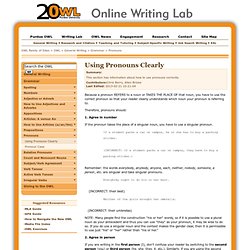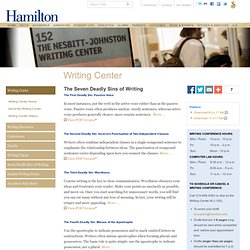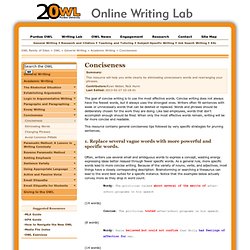

I Won't Hire People Who Use Poor Grammar. Here's Why. Pronouns. Summary: This section has information about how to use pronouns correctly.

Contributors:Chris Berry, Allen BrizeeLast Edited: 2013-02-21 10:21:04 Because a pronoun REFERS to a noun or TAKES THE PLACE OF that noun, you have to use the correct pronoun so that your reader clearly understands which noun your pronoun is referring to. Therefore, pronouns should: 1. If the pronoun takes the place of a singular noun, you have to use a singular pronoun. If a student parks a car on campus, he or she has to buy a parking sticker. (INCORRECT: If a student parks a car on campus, they have to buy a parking sticker.) Remember: the words everybody, anybody, anyone, each, neither, nobody, someone, a person, etc. are singular and take singular pronouns. Everybody ought to do his or her best. (INCORRECT: their best) Neither of the girls brought her umbrella. (INCORRECT: their umbrellas) 2.
When a person comes to class, he or she should have his or her homework ready. 3. Don't be vague or ambiguous. (Who are "they"?) Dangling Modifiers. Summary: This resource explains what a dangling modifier is and how to correct the problem.

Contributors:Chris Berry, Karl StolleyLast Edited: 2013-01-07 12:05:23 A dangling modifier is a word or phrase that modifies a word not clearly stated in the sentence. A modifier describes, clarifies, or gives more detail about a concept. Seven Sins of Writing - Seven Deadly Sins of Writing. The First Deadly Sin: Passive Voice In most instances, put the verb in the active voice rather than in the passive voice.

Passive voice often produces unclear, wordy sentences, whereas active voice produces generally clearer, more concise sentences. More ... View PDF Version* The Second Deadly Sin: Incorrect Punctuation of Two Independent Clauses Writers often combine independent clauses in a single compound sentence to emphasize the relationship between ideas. View PDF Version* The Third Deadly Sin: Wordiness Concise writing is the key to clear communication. View PDF Version* The Fourth Deadly Sin: Misuse of the Apostrophe Use the apostrophe to indicate possession and to mark omitted letters in contractions.
View PDF Version* The Fifth Deadly Sin: Misplaced and Dangling Modifiers Misplaced and dangling modifiers create illogical, even comical, sentences. View PDF Version* The Sixth Deadly Sin: Pronoun Problems View PDF Version* The Seventh Deadly Sin: Committing Pet Peeves View PDF Version* Apostrophe by mcgeeg10. Conciseness. Summary: This resource will help you write clearly by eliminating unnecessary words and rearranging your phrases.

Contributors:Ryan Weber, Nick HurmLast Edited: 2013-02-27 10:18:41 The goal of concise writing is to use the most effective words. Concise writing does not always have the fewest words, but it always uses the strongest ones. Writers often fill sentences with weak or unnecessary words that can be deleted or replaced. This resource contains general conciseness tips followed by very specific strategies for pruning sentences. 1. Often, writers use several small and ambiguous words to express a concept, wasting energy expressing ideas better relayed through fewer specific words. Wordy: The politician talked about several of the merits of after-school programs in his speech (14 words) Concise: The politician touted after-school programs in his speech. (8 words) Wordy: Suzie believed but could not confirm that Billy had feelings of affection for her. (6 words) (20 words) (9 words) (10 words)
Composition. Strunk, William, Jr. 1918. Elements of Style.